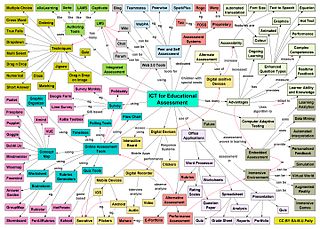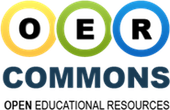
Information and communications technology (ICT) is an extensional term for information technology (IT) that stresses the role of unified communications and the integration of telecommunications and computers, as well as necessary enterprise software, middleware, storage and audiovisual, that enable users to access, store, transmit, understand and manipulate information.

Cameroon is a Central African nation on the Gulf of Guinea. Bantu speakers were among the first groups to settle Cameroon, followed by the Muslim Fulani until German domination in 1884. After World War I, the French took over 80% of the area, and the British 20%. After World War II, self-government was granted, and in 1972, a unitary republic was formed out of East and West Cameroon. Until 1976 there were two separate education systems, French and English, which did not merge seamlessly. French is now considered the primary language of instruction. Local languages are generally not taught as there are too many, and choosing between them would raise further issues.

Open educational resources (OER) are teaching, learning, and research materials intentionally created and licensed to be free for the end user to own, share, and in most cases, modify. The term "OER" describes publicly accessible materials and resources for any user to use, re-mix, improve, and redistribute under some licenses. These are designed to reduce accessibility barriers by implementing best practices in teaching and to be adapted for local unique contexts.
The history of education in Africa can be roughly divided into pre- and post- colonial periods. Since the introduction of formal education to Africa by European colonists, African education, particularly in West and Central Africa, is characterised by both traditional African teachings and European-style schooling systems. The state of education reflects not only the effects of colonialism, but instability resulting from and exacerbated by armed conflicts in many regions of Africa as well as fallout from humanitarian crises such as famine, lack of drinking water, and outbreaks of diseases such as malaria and Ebola, among others. Although the quality of education and the quantity of well-equipped schools and teachers has steadily increased since the onset of the colonial period, there are still evident numerous inequalities in the existing educational systems based on region, economic status, and gender.
Editing technology is the use of technology tools in general content areas in education in order to allow students to apply computer and technology skills to learning and problem-solving. Generally speaking, the curriculum drives the use of technology and not vice versa. Technology integration is defined as the use of technology to enhance and support the educational environment. Technology integration in the classroom can also support classroom instruction by creating opportunities for students to complete assignments on the computer rather than with normal pencil and paper. In a larger sense, technology integration can also refer to the use of an integration platform and application programming interface (API) in the management of a school, to integrate disparate SaaS applications, databases, and programs used by an educational institution so that their data can be shared in real-time across all systems on campus, thus supporting students' education by improving data quality and access for faculty and staff.
"Curriculum integration with the use of technology involves the infusion of technology as a tool to enhance the learning in a content area or multidisciplinary setting... Effective integration of technology is achieved when students are able to select technology tools to help them obtain information in a timely manner, analyze and synthesize the information, and present it professionally to an authentic audience. The technology should become an integral part of how the classroom functions—as accessible as all other classroom tools. The focus in each lesson or unit is the curriculum outcome, not the technology."
Eklavya is an Indian NGO based in Bhopal, Madhya Pradesh working in the field of education. It was registered as an all India in 1982. The organization is named after Eklavya, the protagonist of a story in the Mahabharat, for his determination to learn even in the absence of a teacher.
European Schoolnet or EUN is a network of 34 European Ministries of Education, based in Brussels. As a not-for-profit organisation, it aims to bring innovation in teaching and learning to its key stakeholders: Ministries of Education, schools, teachers, researchers, and industry partners.

Faculty of Education, University of Cambridge is the School of Education at the University of Cambridge in Cambridge, United Kingdom. It was established in 2001. It is part of the school of humanities and social sciences at the University of Cambridge.

The Institute for the Study of Knowledge Management in Education (ISKME), is a 501(c)(3) non-profit organization founded in 2002. Located in Half Moon Bay, California, its mission is to make learning and knowledge sharing participatory, equitable, and open.

Open educational practices (OEP) are part of the broader open education landscape, including the openness movement in general. It is a term with multiple layers and dimensions and is often used interchangeably with open pedagogy or open practices. OEP represent teaching and learning techniques that draw upon open and participatory technologies and high-quality open educational resources (OER) in order to facilitate collaborative and flexible learning. Because OEP emerged from the study of OER, there is a strong connection between the two concepts. OEP, for example, often, but not always, involve the application of OER to the teaching and learning process. Open educational practices aim to take the focus beyond building further access to OER and consider how in practice, such resources support education and promote quality and innovation in teaching and learning. The focus in OEP is on reproduction/understanding, connecting information, application, competence, and responsibility rather than the availability of good resources. OEP is a broad concept which can be characterised by a range of collaborative pedagogical practices that include the use, reuse, and creation of OER and that often employ social and participatory technologies for interaction, peer-learning, knowledge creation and sharing, empowerment of learners, and open sharing of teaching practices.

Keith M Lewin is a British Professor of International education and Development at the University of Sussex and Director of the Consortium for Research on Educational Access, Transitions and Equity (CREATE). He is known for his work in educational planning, economics and finance of education, teacher education, assessment, science and technology education policy in developing countries, educational aid and program evaluation. He has been adviser to various governmental, multilateral and non-profit organisations on education planning and policy, including the World Bank, DFID, UNESCO International Institute for Educational Planning, UNICEF, UNDP, AusAID and others. His country experience includes projects in Ghana, Rwanda, Uganda, Kenya, Tanzania, Malawi, South Africa, Zimbabwe, Mauritius, Trinidad and Tobago, Barbados, India, Sri Lanka, Bangladesh, Malaysia, and China.

OER Commons is a freely accessible online library that allows teachers and others to search and discover open educational resources (OER) and other freely available instructional materials.
Open educational resources (OER) are learning materials that reside in the public domain or have been released under an intellectual property license that permits their free use and re-purposing by others. OER policies are adopted by governments, institutions or organisations in support of the creation and use of open content, specifically open educational resources (OER), and related open educational practices.

OER Africa is an initiative of Saide, established in 2008 with support from the William and Flora Hewlett Foundation, to collaborate with higher education institutions in Africa in the development and use of Open Educational Resources (OER), to enhance teaching and learning. OER Africa's vision is to support the emergence of vibrant and sustainable African education systems and institutions that play a critical role in building and sustaining African societies and economies through free and open development and sharing of common intellectual capital. Recently, OER Africa undertook collaborative work to develop the professional competences and skills of stakeholders within African higher education institutions so that they can implement OER practices to improve the quality of teaching and learning. Currently, OER Africa is
Information Communications Technology is usually included in the Home Economics and Livelihood Education program in grade school and taught through the Technology and Home Economics program in high school. The recent status of ICT education in the Philippines, along with other Southeast Asian countries, was surveyed by the Southeast Asian Ministers of Education Organization (SEAMEO) in 2011. Using the UNESCO model of ICT Development in Education, the countries were ranked as Emerging, Applying, Infusing or Transforming. The Philippines were ranked at the Infusing stage of integrating ICT in education, indicating that the country has integrated ICT into existing teaching, learning and administrative practices and policies. This includes components such as a national vision of ICT in education, national ICT plans and policies, complementary national ICT and education policies, professional development for teachers and school leaders, community or partnership and teaching and learning pedagogies. A 2012 study reported that public high schools in Metro Manila had a computer to student ratio of 1:63. While 88 percent of schools have internet connections, half of the students claimed not to be using it.
Open Educational Practices in Australia refers to the development, implementation and use of Open educational resources (OER), open access, open learning design, open policies, and Massive Open Online Courses (MOOCs) to open up education in Australia.
Educational technology in sub-Saharan Africa refers to the promotion, development and use of information and communication technologies (ICT), m-learning, media, and other technological tools to improve aspects of education in sub-Saharan Africa. Since the 1960s, various information and communication technologies have aroused strong interest in sub-Saharan Africa as a way of increasing access to education, and enhancing its quality and fairness.

Educational management refers to the administration of the education system in which a group combines human and material resources to supervise, plan, strategise, and implement structures to execute an education system. Education is the equipping of knowledge, skills, values, beliefs, habits, and attitudes with learning experiences. The education system is an ecosystem of professionals in educational institutions, such as government ministries, unions, statutory boards, agencies, and schools. The education system consists of political heads, principals, teaching staff, non-teaching staff, administrative personnel and other educational professionals working together to enrich and enhance. At all levels of the educational ecosystem, management is required; management involves the planning, organising, implementation, review, evaluation, and integration of an institution.
The Survey of Teachers in Pre-Primary Education (STEPP) is the first international survey for low-and-middle-income countries designed to collect information that is known to affect the quality of pre-primary education from pre-primary teachers and centre heads. The collected information concerns training and professional development, pedagogical and professional practices, working conditions and job satisfaction, and characteristics of pre-primary personnel and the settings in which they work.
Sara Hennessy is a British scholar. As of 2022, she is a Professor of Teacher Development and Pedagogical Innovation in the Faculty of Education at the University of Cambridge. Hennessy has worked in the field of EdTech for over three decades, focusing particularly on professional development, teacher inquiry, and interactive pedagogy, including in sub-Saharan Africa. She is a Research Director of EdTech Hub, a multi-million-pound 8-year program funded by the UK's Foreign, Commonwealth and Development Office.









